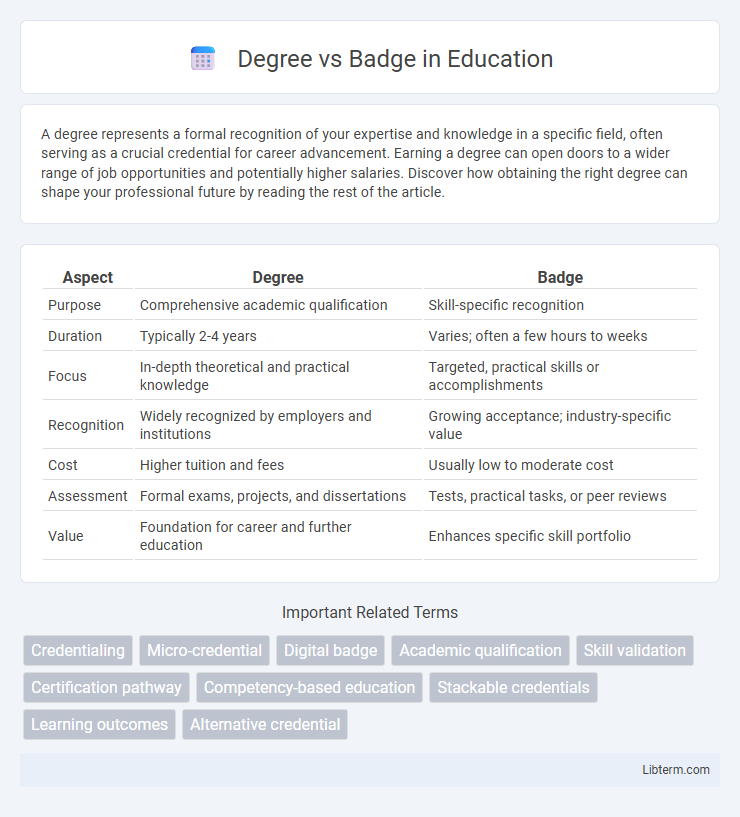A degree represents a formal recognition of your expertise and knowledge in a specific field, often serving as a crucial credential for career advancement. Earning a degree can open doors to a wider range of job opportunities and potentially higher salaries. Discover how obtaining the right degree can shape your professional future by reading the rest of the article.
Table of Comparison
| Aspect | Degree | Badge |
|---|---|---|
| Purpose | Comprehensive academic qualification | Skill-specific recognition |
| Duration | Typically 2-4 years | Varies; often a few hours to weeks |
| Focus | In-depth theoretical and practical knowledge | Targeted, practical skills or accomplishments |
| Recognition | Widely recognized by employers and institutions | Growing acceptance; industry-specific value |
| Cost | Higher tuition and fees | Usually low to moderate cost |
| Assessment | Formal exams, projects, and dissertations | Tests, practical tasks, or peer reviews |
| Value | Foundation for career and further education | Enhances specific skill portfolio |
Understanding Degrees and Badges
Degrees represent comprehensive academic achievements awarded by accredited institutions after completing a structured curriculum, while badges signify specific skills or competencies earned through targeted training or assessments. Understanding the distinction involves recognizing that degrees provide broad foundational knowledge and formal certification, whereas badges offer modular, skill-focused validation often used for professional development. Both serve complementary roles in education and career advancement, reflecting varying depths and scopes of expertise.
Key Differences Between Degrees and Badges
Degrees represent comprehensive academic achievements awarded by accredited institutions after completing extensive coursework over several years, often indicating mastery in a broad field of study. Badges are digital or physical credentials recognizing specific skills or competencies acquired through shorter, focused training or practical experience. Degrees typically hold higher academic and professional value for career advancement, while badges provide targeted evidence of specialized expertise and continuous learning.
Educational Pathways: Traditional vs Modern
Traditional educational pathways often emphasize degrees from accredited institutions, offering comprehensive knowledge and formal recognition in various fields. Modern alternatives like digital badges provide flexible, skill-specific certification that caters to evolving industry demands and micro-credentialing trends. Both pathways serve distinct purposes in professional development, balancing depth and agility in learning outcomes.
Value and Recognition in the Job Market
Degrees from accredited universities offer recognized, comprehensive education that employers often require for advanced roles and career growth, providing long-term value through in-depth knowledge and formal validation. Badges represent specific skills or competencies, delivering immediate proof of expertise that can enhance resumes and LinkedIn profiles, particularly in fast-evolving industries seeking up-to-date, targeted abilities. While degrees carry higher prestige and widespread recognition across multiple sectors, badges complement them by highlighting specialized skills valued in niche job markets and continuous professional development.
Time Investment and Flexibility
Degrees typically require several years of full-time study, demanding a significant time investment and often adhering to rigid academic schedules. Badges offer a flexible alternative, allowing learners to acquire specific skills in shorter time frames, often through online or self-paced programs. This flexibility enables professionals to upskill or reskill without committing to the extended duration associated with traditional degrees.
Cost Comparison: Degrees vs Badges
Degrees typically involve higher costs, often ranging from $20,000 to $50,000 or more for a full program, while badges are far more affordable, usually costing between $100 and $1,000 depending on the provider and course length. The significant financial investment required for degrees includes tuition, fees, textbooks, and sometimes accommodation, whereas badges offer a cost-effective alternative with flexible, short-term learning tailored to specific skills. Employers increasingly recognize digital badges as evidence of specialized knowledge, making them a practical, budget-friendly option compared to traditional degrees.
Skill Assessment and Validation
Degrees provide comprehensive academic validation through structured curricula and standardized testing, establishing foundational knowledge and critical thinking abilities in a specific discipline. Badges offer targeted skill assessment by verifying mastery of specific competencies or practical tasks, often through real-world applications and digital credentials. Skill validation through badges is typically more flexible, timely, and focused on up-to-date industry-relevant abilities compared to the broader and longer-term validation of degrees.
Career Growth Opportunities
Degrees often provide comprehensive education and are widely recognized by employers, offering a strong foundation for long-term career growth and advancement in many fields. Badges, representing specific skills or micro-credentials, enable professionals to quickly demonstrate expertise and stay current with industry trends, enhancing job mobility and niche specialization. Combining degrees with targeted badges can maximize career opportunities by blending deep knowledge with up-to-date competencies.
Digital Credentials and Their Future
Digital credentials are transforming education by offering scalable, verifiable recognition beyond traditional degrees. Badges provide micro-credentialing for specific skills or achievements, enabling learners to showcase competencies in real-time. The future of digital credentials lies in blockchain technology and interoperable platforms that enhance trust, portability, and lifelong learning pathways.
Choosing the Right Credential for You
Selecting the right credential depends on your career goals, industry demand, and learning style. Degrees provide comprehensive education and are often required for professions like engineering or medicine, while badges offer targeted, skill-specific recognition ideal for tech or creative fields. Evaluating job market trends and personal development needs ensures you invest in credentials that maximize your employability and expertise.
Degree Infographic

 libterm.com
libterm.com